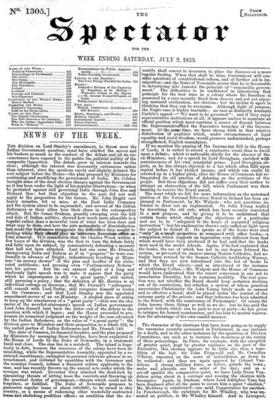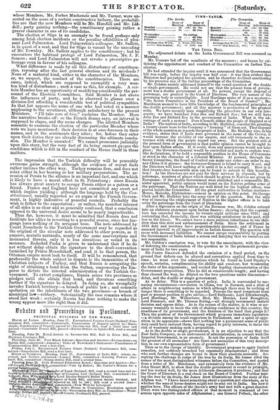The character of the elections that have been going on
to supply the vacancies recently occasioned in Parliament, in one instance by a death, and in the other instances by the operation of Election Committees, are such as to increase the weariness at the vanity of these proceedings. In Clare, for example, with the exception of greater quiet, kept by greater vigilance on the part of the Executive, this election appears to be little else than a repe- tition of the last. Sir John Fitzgerald and Mr. Cornelius O'Brien, unseated on the score of intimidation, go down to be reelected ; and they are again opposed by Colonel Van- deleur. A strong military force, as before, guards the town ; mobs and placards are the order of the day; and as a set-off against the comparative quiet, we have Lady Grace Van- deleur going about in a carriage and rousing the electors with harangues. Again, in Durham, where Lord Adolphus Vane has been displaced after all the pains to secure him a quiet " election," Mr. Mowbray is substituted—one mild Conservative for another. In Peterborough, the substitute for Mr. Whalley, who was un- seated on petition, is Mr. Whalley himself. And in Liverpool, whose Members, Mr. Forbes Mackenzie and Mr. Turner, were un- seated on the score of a certain constructive bribery, the probabili- ties are that the new Members will be Mr. Horsfall and Mr. Lid- dell ; party gaining nothing—the constituency gaining rather a graver character in one of its candidates.
The election at Sligo is an anomaly to be found perhaps'only among Irish election incidents or the peculiar affabilities of plea- sant Lord Palmerston. Lord Palmerston's colleague, Mr. Sadleir, is in quest of a seat, and that for Sligo is vacant by the unseating of Mr. Townley. Mr. Sadleir applies to the constituency ; but he encounters the habitual protege of Lord Palmerston, Mr. J. P. Somers ; and Lord Palmerston will not revoke a prescriptive pa- tronage even in favour of his colleague. What difference is made by all this disturbance of constituen- cies, reposing after the last general election and its misdeeds ? None of a material kind, either in the character of the Members, or, we suspect, the conduct of the constituencies. There are cases, indeed, which are supposed to exemplify a very wan- ton kind of disturbance ; such a case as this, for example. A cer- tain Member has an opportunity of modifying considerably the per- sonnel of the Election Committees. Said Member is not above the influences of party, and he is observed to glance over a division-list affording a considerable test of political sympathies. In that list appears the name of one who had voted in a manner nnpleasing to the scrutineer, although satisfactory to the present Ministers. "I'll take care Of him," exclaims the Member. Here the narrative breaks off: as the French drama says, an interval is supposed to elapse, and the scene changes. The allotted Members assemble to examine the election of the particular Member whose i vote we have mentioned : their decision is at once foreseen in their names, and in the sentiments they utter ; for, before they enter upon their duties they are already discussing the ultimate conclu- sion. The Member is unseated ! We cannot pronounce judicially upon this story, but the very fact of its being current gauges the confidence which is felt in the conduct of the House itself in these matters.



























